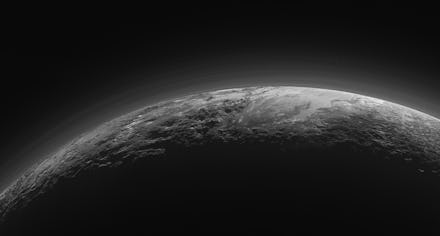Water on Pluto? Scientists Just Discovered a Possible Subsurface Ocean on the Dwarf Planet

It seems Pluto is incapable of running out of surprises.
The latest research suggests the tiny dwarf planet may hold a vast subsurface ocean under its icy crust.
When NASA's New Horizons spacecraft whizzed past Pluto last year, scientists were quick to conclude it once had a liquid ocean that probably froze over long ago.
Now new thermal models suggest that ocean is still there, though it might be in the process of slowly refreezing.
"Thanks to the incredible data returned by New Horizons, we were able to observe tectonic features on Pluto's surface, update our thermal evolution model with new data and infer that Pluto most likely has a subsurface ocean today," Noah Hammond, a graduate student in Brown, said in a statement.
How does Pluto have liquid water when it's 3.7 billion miles from the sun?
Scientists think Pluto may have had radioactive elements in its crust that generated enough heat to keep a layer of liquid water sloshing around below the surface.
Still, the frigid conditions of the outer edge of the solar system mean the ocean is likely refreezing. Hammond doesn't think it's completely frozen yet, because the high pressure on Pluto would have turned the ice into a different physical state called ice II. Ice II is more compact and would have caused the planet to shrink.
Scientists think Pluto may have had radioactive elements in its crust that generated enough heat to keep a layer of liquid water sloshing around below the surface.
But there aren't any geological signs that Pluto has shriveled up. In fact, it looks like Pluto has actually expanded over time.
"A subsurface ocean that was slowly freezing over would cause this kind of expansion," Hammond said in the statement. "So we conclude that ice II has not formed, and therefore that the ocean hasn't completely frozen."
It seems Pluto may have more surprises in store for us.
"That's amazing to me," Hammond said. "The possibility that you could have vast liquid water ocean habitats so far from the sun on Pluto — and that the same could also be possible on other Kuiper belt objects as well — is absolutely incredible."
Read more: